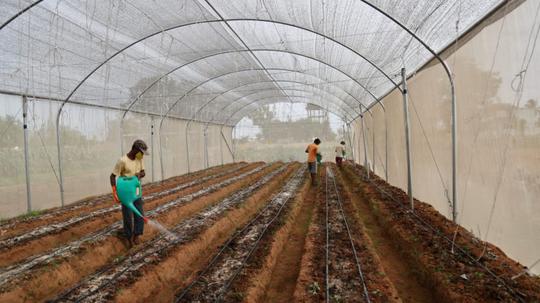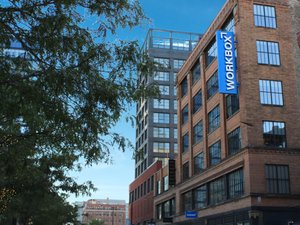
Climate change is already impacting the way we grow crops, both directly, through extreme weather events and irregularities in long-standing climate patterns, and indirectly, through increased incidence of pests and pathogens, according to a 2014 National Climate Assessment from the U.S. Department of Agriculture. One tested solution that protects farmers from extreme weather: greenhouses. These small scale operations, while prevalent in the developed world, can cost upwards of $5,000, not including maintenance costs. So what about the developing world, home to 78% of the world’s harvested croplands, where farmers cannot afford such prices and effects of climate change are most pronounced? That's where Kheyti comes in. Kheyti (Hindi for “farming”) is a social impact startup that has developed a low-cost and modular (hence "in a box") greenhouse solution that fits in about 2,000 square feet of land (typically 2-5 percent of most small-sized farms). Kheyti's greenhouse has shown to grow seven times more food with up to 90 percent less water, according to the startup. With firm belief in a sustainable development model, Kheyti also bundles services like installation training, smart farming education, affordable loan financing, access to high quality seeds, and linkage to a ready and fair marketplace.
While the startup was launched in December 2015 in rural India, cofounder Saumya (who only goes by her first name), just graduated from Northwestern University’s Kellogg School of Management with her MBA.
“Kheyti’s goal is to protect farmers from the unpredictability of farming and income variability, ultimately leading to better food security for us all,” she said in an interview with Chicago Inno, speaking from Jerusalem, where Kheyti is currently a part of the MassChallenge Accelerator. “Growing up in Bihar (a region in northern India), I was acutely aware of challenges faced by small farmers and was motivated to apply existing technologies towards this problem, but in the context of the developing world."
Kheyti’s greenhouse is 8m x 27m x 4m (though customizable) and is designed to facilitate application of drip irrigation -- or the systematically low and strategic use of water. While easy to assemble and install, its steel structure provides strength and durability in extreme wind, rain and hail. It is also covered in two layers of shade netting on the top to reduce heat, as well as insect netting on all sides to enable protection from pests. Through financing partnerships, the startup is offering its product and services to pilot customers at $2,300, with a $400 down payment and quarterly repayments of $170 over three years.
Kheyti says it doesn't believe in “handout” solutions -- and hence works closely with farmers on the ground. A Kheyti agronomist works with farmers in person, and a WhatsApp messaging group allows farmers to share best practices with each other.
“Our biggest stakeholders and subject matter experts are the farmers who we are aiming to serve," she said. "While greenhouse technology might be new to them, irrigation is not. They are constantly helping us iterate on innovative practices that will help reduce costs and improve yields."
Working with 15 farmers in its first year, it has since expanded to adding 35 more, currently all in the Telangana district of India. Northwestern’s Institute of Sustainability and Energy (ISEN) contributed $25,000 to fund the startup and Kellogg, to which Saumya credits much of the startup’s traction, named Saumya a Zell Fellow and has provided $70,000 to the company in funding through the Kellogg Social Entrepreneurship Award. Kheyti also took home $40,000 at the Global Social Venture Competition in Berkeley and won first place at the 2017 Columbia Venture Competition in New York.
Saumya came to Kellogg during early stages of Kheyti’s existence -- not knowing where the startup would be when she was done with school, but curious about applying a traditional business education to social entrepreneurship. Concentrating in Marketing at Kellogg, she confirmed her belief here that there is value in running a nonprofit like any other business -- “if a venture is not sustainable, there’s no point doing it,” she said.
Kheyti is currently working with an extreme affordability course at Stanford and the Segal Design Institute at Northwestern to make the greenhouses even more affordable with new, lower cost materials. As it improves its product, collects data on farmer yield, conditions and efficiency in the greenhouse and continues to work with more farmers, it is looking for funding as well as further design partnerships.
Edit: This article has been updated to reflect the correct dimensions of the Kheyti greenhouse and the specifics of its current pricing structure. The errors are regretted.








